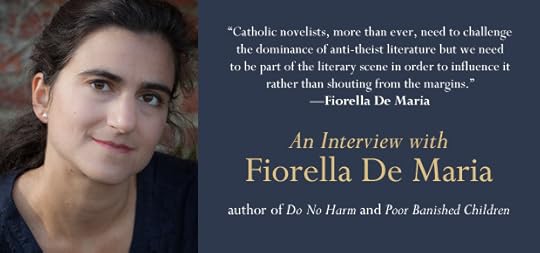An interview with novelist Fiorella De Maria

Fiorella De Maria is the author of four novels, including two published by Ignatius Press: Do No Harm and Poor Banished Children. Her other novels are The Cassandra Curse and Father William’s Daughter. Her poetry and short stories have appeared in such publications as Dappled Things. She and her family live in England. Ignatius Press Novels interviewed her via e-mail.
In a previous interview with Ignatius Insight, you described wanting to be a writer from a young age. Do you think being exposed to good art as a child played a role in that?
De Maria: Definitely, perhaps more than anything else. I learnt how to write through reading incessantly. I worked my way through all the classics—the Narnia stories, Alice in Wonderland, then later on Dickens, Austen, Eliot— but I also read a lot of modern, good quality fiction. When you read books as a child, it stretches you in all kinds of ways without you even realising it; your vocabulary improves, you learn the way adult authors articulate ideas, your imagination blossoms. I was also fortunate enough to live near a theatre and was taken to see plays from an early age where I could experience a very different, very immediate form of creativity. I remember being taken to see the original play version of Peter Pan and trembling with fear at the sight of Peter and Wendy stranded on a rock in the middle of a darkening stage, with Peter saying, ‘to die would be an awfully big adventure!’ It amazed me how real it all felt.
Now that you have children of your own, how do you go about introducing literature to them?
De Maria: My children are still very young (the youngest is only one and the eldest seven) but I encourage the older ones to read for pleasure and tell them some of my favourite stories on car journeys. I also try to read to them at mealtimes if there is time, though I have found it can be quite challenging. I was reading through a childhood favourite, Annabel’s Raven, recently and I was laughing so much I had to hand over the book to my husband. I think my children thought I was crazy!
What is your creative process like? Do you have a favorite bit of writing advice?
De Maria: I usually start with a single idea and the characters and plot develop around it. For example, with Do No Harm, it started years ago when I was speaking at a conference and a doctor asked me what doctors in Britain were to do if they were presented with a living will instructing them to remove a patient’s food and fluids (so that the patient would dehydrate to death). As I answered, I think I used the words ‘under pain of an assault charge’ and I just thought, ‘But what if a doctor was charged? What would happen to him?’ The whole novel sprang from that ‘what if?’ moment.
I usually write the opening chapter and the climactic chapter of a novel first, but avoid detailed plans as I prefer the adventure of seeing where the narrative takes me and it ALWAYS goes in a direction I did not initially intend. The characters will develop in a way I did not expect or some small plot detail added at the last minute will change the momentum of the story. I would like to pretend I sit in a book-lined study, writing in a state of reverie for hours with Gregorian chant playing softly in the background, but with four young children I tend to write in snatches and have trained myself to focus very quickly.
The best bit of writing advice I have ever been given is a variant on some words of wisdom given to my sister-in-law when she started at drama school. She was told: “If you can think of anything else you might rather do than be an actor, go and do it. You don’t train as an actor if there is ANYTHING else you would consider doing with your life.’ I think the same is true of writing. I get teenagers coming to me with their work, convinced that they are one step away from stardom and a multi-million pound royalties’ cheque, but the overwhelming majority of authors are not wealthy, the majority are not celebrities, but all of them write because they love to write and can’t imagine doing anything else.
Ignatius Press has published two of your novels, and they are very different: Poor Banished Children is a historical novel, and Do No Harm is a modern legal thriller. Are you more comfortable writing fiction set in modern times, or do you prefer the historical?
Carl E. Olson's Blog
- Carl E. Olson's profile
- 20 followers



